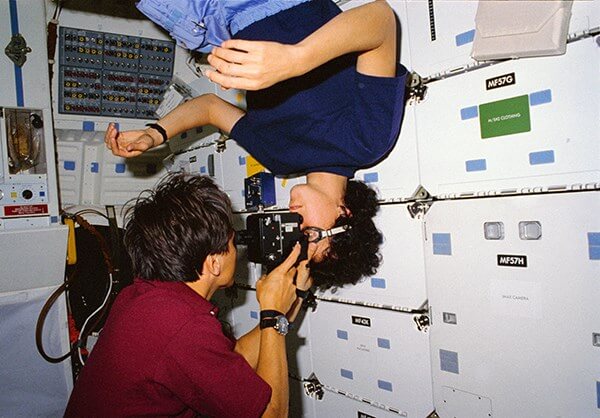An Overview of Aerospace Medicine
Aerospace physicians support the health of people who fly for a living — pilots, aircrews and astronauts, all of whom face unique occupational hazards. These doctors often have military backgrounds, as they need to have training and experience in both medicine and aviation.
Here on Earth, doctors often take care of sick or injured patients in normal environments, but in space medicine, the situation is quite the opposite. A big part of this field revolves around preventative medicine, with doctors making sure that their patients are in top health so that they can handle the abnormal environment of flights, especially if their patients are going to space. Much like sports trainers, these doctors make sure that astronauts are physically prepared to perform at the highest levels.
According to the Aerospace Medicine Association, aviation medicine was originally driven by the high losses of life due to physically unfit pilots during World War I. Later, the field evolved beyond aviation medicine to include aerospace medicine once crewed space flight began.
Today, aerospace physicians, such as flight surgeons, provide medical support for astronauts during training and missions. They also play a role in selecting astronauts for flying on missions, according to the Canadian Space Agency (CSA). If astronauts have health issues in space, it is a dangerous and expensive problem to solve. The CSA explains that flight surgeons help during:
- Pre-flight, by ensuring that the crew is healthy and prepared to use medical equipment or necessary countermeasures to reduce the negative effects spaceflight can have on their health.
- In-flight by maintaining the health of the astronauts and providing 24-hour support at the Mission Control Center.
- Post-flight by examining returning astronauts at the landing site and overseeing their rehabilitation as they reacclimate to Earth.
Effects of Space on the Body
Space agencies have studied the short- and long-term effects of space environments on the human body. Civilians get a small peek into the effects of flight when they experience conditions such as altitude sickness or the feeling of your ears “popping” during a flight. In space, there’s much more to contend with, as leaving the comfortable bubble of our atmosphere creates a range of hazards for humans. NASA describes five categories of stress related to space travel:
- Gravity fields. The weightlessness of space affects spatial orientation, head-eye and hand-eye coordination, balance and locomotion. Plus, without gravity, your bones lose minerals, with density dropping at over 1% per month. To counteract this, astronauts must devote two-and-a-half hours each day to exercising in space.
- Isolation and confinement. The psychological effects of living at the International Space Station (ISS) or in a space vehicle are just as important as the physical issues. Being confined to a small space over long periods of time can cause behavioral issues among the group, as well as declines in mood and morale, trouble sleeping and boredom.
- Hostile/closed environments. It’s not healthy to live in a bubble. Microorganisms such as bacteria transfer easily, your immune system is altered, and stress hormones are elevated.
- Space radiation. At the International Space Station, astronauts are exposed to ten times the radiation that we experience at home. This poses an increased cancer risk and possible damage to the central nervous system, which can cause problems with cognitive function, motor function and behavioral changes. Space can also cause radiation sickness and degenerative tissue diseases, such as cataracts and cardiac issues.
- Distance from Earth. If an astronaut is sick or injured, they can’t exactly call 911 for an ambulance ride to the nearest hospital. The simple fact that they are far away from Earth is a health risk. This is a concern on the ISS, but it will be even more critical for future missions to the Moon and Mars. While today’s space travelers can at least use telemedicine to speak to doctors from millions of miles away, there will be communication delays.
Space Medicine Career Outlook
This highly specialized career helps to support the future of space travel and is crucial to the aerospace industry. The Emergency Medicine Residents’ Association suggests that there is a greater need for highly trained aerospace medicine physicians because of the recent focus on an accelerated lunar program and the emerging commercial space flight industry. This medical specialty isn’t just about space, either. Many space physicians also study the physiology of microgravity on the human body and how it can help to fight conditions here on Earth, such as NASA’s study of astronaut twins Scott and Mark Kelly.
Aerospace medicine helps humans push the bounds of what is possible, as we continue to explore the unknown.
Please remember we all have different opinions, Think Before You Speak or Write Something that is cruel to Others. After all, We are only Humans. Wishing you clear skies and wide eyes. To share your experiences or just leave a comment there is a area below. Read or listen.
We are the change the world has been waiting for!
Have you witnessed an unidentified flying object?
Whether you think UFOs are black projects, extraterrestrial craft, something else altogether, or just don’t know.
Unconditional love. The road we all get to walk. Unconditional love is like the sun.
WE ARE THE DISCLOSURE ~ WE HAVE NEVER BEEN ALONE
Love and Regards,
Happy Quarantine
Thank You,
Nancy Thames
Source aerospace

